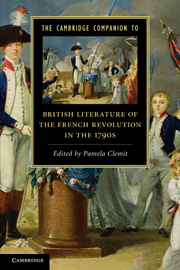Book contents
- Frontmatter
- 1 The Political Context
- 2 Burke, Reflections On The Revolution In France
- 3 Paine, rights Of Man
- 4 Burke And Paine: Contrasts
- 5 Wollstonecraft, vindications and historical And Moral View Of The French Revolution
- 6 Godwin, Political Justice
- 7 Wollstonecraft and Godwin: dialogues
- 8 Popular radical culture
- 9 Counter-revolutionary culture
- 10 Women’s voices
- 11 Novels of opinion
- 12 Revolutionary drama
- 13 Politics and poetry
- Guide to further reading
- Index
- The Cambridge Companions to...
4 - Burke And Paine: Contrasts
Published online by Cambridge University Press: 28 July 2011
- Frontmatter
- 1 The Political Context
- 2 Burke, Reflections On The Revolution In France
- 3 Paine, rights Of Man
- 4 Burke And Paine: Contrasts
- 5 Wollstonecraft, vindications and historical And Moral View Of The French Revolution
- 6 Godwin, Political Justice
- 7 Wollstonecraft and Godwin: dialogues
- 8 Popular radical culture
- 9 Counter-revolutionary culture
- 10 Women’s voices
- 11 Novels of opinion
- 12 Revolutionary drama
- 13 Politics and poetry
- Guide to further reading
- Index
- The Cambridge Companions to...
Summary
The confrontation between Burke and Paine in the 1790s has been called ‘probably the greatest joust in the lists of political philosophy that Great Britain ever witnessed’. This comment by a modern political historian echoes Burke's metaphor of chivalric combat, memorably applied in his Reflections on the Revolution in France (1790) to prospective defenders of the French royal family but then used in an ironic sense by his antagonists to characterize Burke's own crusade against the forces of revolution in Britain. Those forces took many shapes, especially in Burke's increasingly paranoiac imagination, but his most dangerous and influential adversary was undoubtedly Paine, and the quarrel between them was seen by contemporary observers, as it is today, as a paradigm of the whole Revolution controversy. Not only did Burke and Paine stake out the two fundamental alternatives in any revolutionary situation – to support radical change or to oppose it – but they did so in terms that transformed the nature of political discourse, altering its language and forms. Within months of the publication of Paine's reply to the Reflections, the two parts of Rights of Man (1791, 1792), pamphlets were appearing with titles like Paine and Burke Contrasted, or An Address to the Inhabitants of Great Britain (1792), wording indicative both of the self-consciousness of the Revolution debate (it was, in part, a polemic on polemic itself) and of the extent to which the war of ideas had become personalized. Reading Burke and Paine, and choosing between them, was a defining experience of the 1790s, and the Burke–Paine binary helped to shape the dualistic mindset of literary Romanticism as it did the broader political culture of post-1789 Britain.
- Type
- Chapter
- Information
- Publisher: Cambridge University PressPrint publication year: 2011



